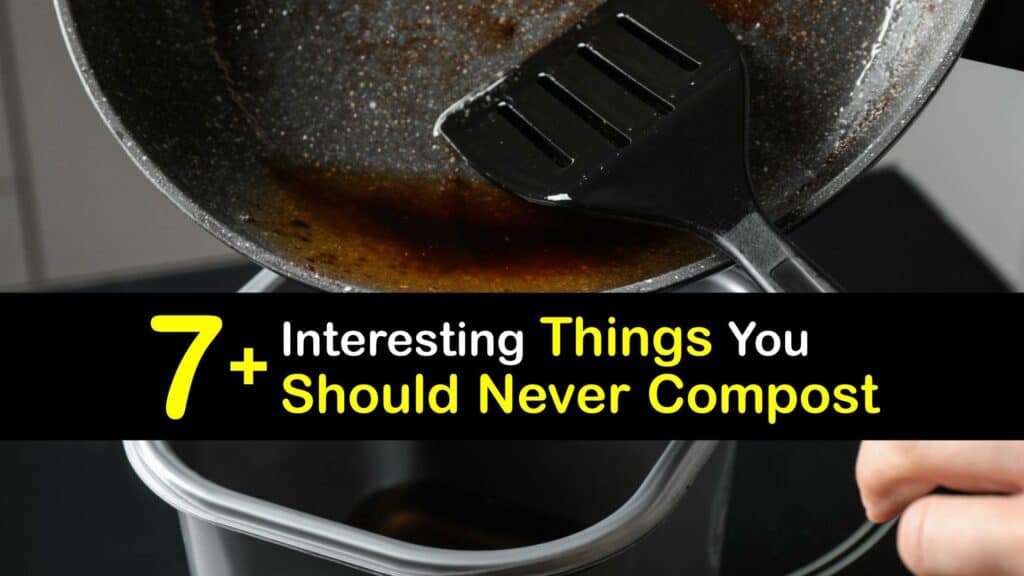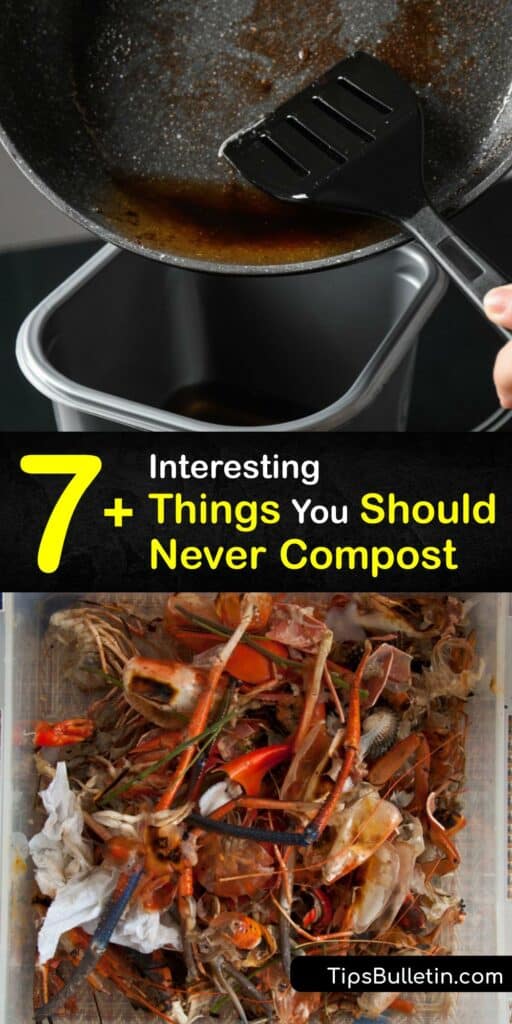Many people turn to compost as a solution for eliminating kitchen waste. Home composting is a simple and effective way to reduce waste from your home while creating natural fertilizer. A crucial part of making a successful compost is knowing what things you should not compost.
Making compost bins is easy – it’s not as daunting as it may seem. Many food scraps you discard and even yard waste outside your house are ideal compost materials. After understanding the composting process, it’s easy to identify which items you can not compost.
Composting involves balancing nitrogen and carbon-based materials with liquids to encourage decomposition with help from the bacteria and other microorganisms in your compost pile.

What Not to Put in a Compost Bin
Because composting involves decomposing organic materials, the best items include plant material and other organic matter. Despite most things coming from Mother Nature being acceptable to use in your compost pile, there are some things to avoid.
Many items don’t belong in compost piles because of the smell they release when they decompose. Meat scraps are one type of food waste many homes have; however, the smell of decomposing meat draws scavengers and unwanted pests to your yard.
Aside from drawing unwanted attention to your compost pile, when looking at what not to compost, some materials harm compost bacteria or slow the progress of your compost.
Avoid Composting Treated Wood Scraps
Most wood debris is acceptable to include in your compost because it adds carbon and helps prevent the pile from becoming too moist. It can be added to your list of compostable items. The ideal ratio of brown materials like wood chips to green is four to one, but not all wood is okay.
Any wood treated with preservatives is harmful to compost because it may kill the bacteria necessary for decomposition. However, you can compost newspaper and cardboard if you break it into smaller pieces first. Avoid using any wood debris that was stained, varnished, or painted.

Should You Add Oils and Greasy Foods to Compost Bins?
Cooking oil is a staple in many meals, and foods like bacon naturally produce grease as they cook. After preparing a meal, many people wonder with what to do with these leftover substances, and oils and greasy foods are high on the list of what not to compost.
Like meats, these items encourage pest activity in compost because they smell like cooked food. While a raccoon disturbing your compost tumbler may not seem like a big deal, the constant disturbance may slow the decomposition process.
Things You Should Not Compost From Your Yard
Examples of yard waste that include grass clippings and weeds are perfect for tossing into your compost heap. As green materials, they add nitrogen to the pile and contribute to the moisture level inside the compost.
The problem with adding dried leaves or grass clippings to your compost comes from whether or not you use pesticides as part of your lawn care. Weeds, grass, and trees treated with pesticides cannot be composted. Any chemicals left on the organic material may negatively affect plants once you add the finished compost to your soil.
Pet Waste
Manure is a popular choice for gardening because it helps with soil structure, and the nutrients left in animal waste bleed into the ground to aid plant growth. Note that there is a huge difference between compost and manure, although some people confuse the two terms.
Many recommend hot composting manure first to kill harmful bacteria or parasites; however, this only applies to manure from livestock animals like chickens, rabbits, and sheep.
Waste from family pets should never make it into your compos because animal feces carry many parasites that contribute to human disease. For dogs, roundworms are a significant concern. Cat urine may contain an organism known to cause a condition that is specifically impactful to pregnant women and their unborn children.
Plant Debris to Avoid Composting
If you cut down diseased plants or crops infested with insects, immediately destroy them to prevent infecting other plants. The same applies to your compost pile because diseased crops are plants that should not be composted.
Disease pathogens and insects require high temperatures in your compost, and even with hot composting, the risk is not worth reintroducing a disease to your crops.
Weeds not treated with herbicides are fine to add to the compost as long as they have not begun to seed. Weed seeds, like bacteria, are difficult to kill in compost heaps. If compost doesn’t reach around 145°F, you’ll only add seeds for harmful weeds when using the compost later.
What Not to Compost From the Kitchen
As a rule of thumb, most cooked foods are off-limits for composting. It takes time to compost any food waste and the fats and oils in prepared foods are not beneficial to your compost, creating foul smells as they break down. Along with prepared meals, avoid animals and their byproducts.
If you have kitchen scraps after preparing chicken, it’s best to toss them in the trash and skip adding them to your compost. Likewise, never use kitchen waste containing fish parts. The smell of these items as they decompose draws filth flies and rodents to your compost bin.
Dispose of leftover cheese, yogurt, and butter with the rest of your trash because these items attract unwanted animals to your yard in search of a meal. Exclude processed food heavy in dairy.
The Danger of Composting Highly Acidic Foods
Citrus peels are a great addition to compost piles; however, the fruit itself is best used in small amounts. You can compost lemon rinds, but highly acidic foods like limes, tomatoes, and pickled foods harm compost and may even kill the helpful bacteria inside your pile.
If you are using a small outdoor composter, avoid adding fruits and vegetables with hard rinds as these may take longer to break down. Fruits like apples, bananas, and pears are all excellent for compost.
Using Charcoal Ash in Compost
Wood ash is a source of potassium and lime, which benefits your garden by altering the soil pH. Follow our guide to learn how to correctly
Wood ash is a source of potassium and lime, which benefits your garden by altering the soil pH. Follow our guide to learn ways of composting wood ash correctly. However, not all ash left behind after fires helps your compost or garden.
Never include coal and charcoal ash in your compost because their ash is high in sulfur. Adding charcoal ash to your compost bin creates finished compost that is too acidic to benefit the entire garden. Additionally, the chemicals used to coat charcoal briquettes harm plants.
Interesting Items to Add to Your Compost
The composting process is ongoing as you add new organic waste to the heap. Every ingredient needs to benefit your pile’s overall ratio and composition. Since composts accept everyday items, it’s easy to focus on what to add versus what not to put in a compost bin.
Tea bags are typically paper bags with organic tea leaves inside. Composting tea bags is very simple, as they break down easily on their own. If the bag doesn’t use staples or an adhesive to seal it, add the entire bag to the compost or cut the bag and add the wet leaves.
Although it’s not wise to use most animal products in your compost, egg shells are an exception. After cracking and using the egg, rinse and dry the shell to add to your compost to take advantage of the calcium the shell provides.
Non-Food Items to Use in Compost
Not everything that benefits your compost is obvious. Typical items include pencil shavings, shredded toilet paper rolls, cotton balls, and wool clothing.
A byproduct of wood fibers, paper towels are compostable. If you don’t want to waste paper towels by tossing them directly into the trash, add the paper towels to the compost even after cleaning up food and drink spills.
As organic matter, hair can be composted or used as mulch for your plants. The hair to use in your compost bin is not limited to your hair, as pet hair left after grooming works, too; you can even compost cat poop to dispose of it. Avoid using chemically treated or processed hair to avoid introducing harmful substances to the compost.
The material that gathers in your dryer’s lint trap is made of loose clothing fibers and is completely compostable. Dryer lint is a brown material that adds carbon to the compost and is easy to save until you have enough for the compost bin.
When composting, it’s essential that you only use compostable materials. Not only is digging through your compost to remove items unpleasant but forgetting to take something out undermines the progress of your compost bin.
If your compost isn’t progressing, you may have accidentally thrown something non-compostable into the compost pile. You can mix a simple compost accelerator into the bin if needed. Before tossing items into an indoor bin to add to compost, remove any plastic, metal, or rubber to avoid disappointment when you check your compost to find little change.

If our article helped you understand which things you should not compost, please pass this advice on what not to put in a compost bin to your friends on Facebook and Pinterest.